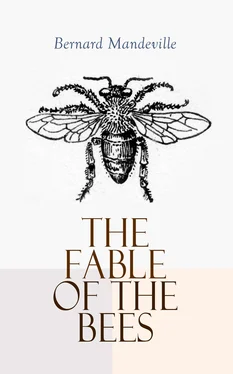Table of Contents
One of the greatest reasons why so few people understand themselves, is, that most writers are always teaching men what they should be, and hardly ever trouble their heads with telling them what they really are. As for my part, without any compliment to the courteous reader, or myself, I believe man (besides skin, flesh, bones, &c. that are obvious to the eye) to be a compound of various passions; that all of them, as they are provoked and come uppermost, govern him by turns, whether he will or no. To show that these qualifications, which we all pretend to be ashamed of, are the great support of a flourishing society, has been the subject of the foregoing poem. But there being some passages in it seemingly paradoxical, I have in the preface promised some explanatory remarks on it; which, to render more useful, I have thought fit to inquire, how man, no better qualified, might yet by his own imperfections be taught to distinguish between virtue and vice: and here I must desire the reader once for all to take notice, that when I say men, I mean neither Jews nor Christians; but mere man, in the state of nature and ignorance of the true Deity.
AN
INQUIRY
INTO THE
ORIGIN OF MORAL VIRTUE.
Table of Contents
All untaught animals are only solicitous of pleasing themselves, and naturally follow the bent of their own inclinations, without considering the good or harm that, from their being pleased, will accrue to others. This is the reason that, in the wild state of nature, those creatures are fittest to live peaceably together in great numbers, that discover the least of understanding, and have the fewest appetites to gratify; and consequently no species of animals is, without the curb of government, less capable of agreeing long together in multitudes, than that of man; yet such are his qualities, whether good or bad I shall not determine, that no creature besides himself can ever be made sociable: but being an extraordinary selfish and headstrong, as well as cunning animal, however he may be subdued by superior strength, it is impossible by force alone to make him tractable, and receive the improvements he is capable of.
The chief thing, therefore, which lawgivers, and other wise men that have laboured for the establishment of society, have endeavoured, has been to make the people they were to govern, believe, that it was more beneficial for every body to conquer than indulge his appetites, and much better to mind the public than what seemed his private interest. As this has always been a very difficult task, so no wit or eloquence has been left untried to compass it; and the moralists and philosophers of all ages employed their utmost skill to prove the truth of so useful an assertion. But whether mankind would have ever believed it or not, it is not likely that any body could have persuaded them to disapprove of their natural inclinations, or prefer the good of others to their own, if, at the same time, he had not showed them an equivalent to be enjoyed as a reward for the violence, which, by so doing, they of necessity must commit upon themselves. Those that have undertaken to civilize mankind, were not ignorant of this; but being unable to give so many real rewards as would satisfy all persons for every individual action, they were forced to contrive an imaginary one, that, as a general equivalent for the trouble of self-denial, should serve on all occasions, and without costing any thing either to themselves or others, be yet a most acceptable recompence to the receivers.
They thoroughly examined all the strength and frailties of our nature, and observing that none were either so savage as not to be charmed with praise, or so despicable as patiently to bear contempt, justly concluded, that flattery must be the most powerful argument that could be used to human creatures. Making use of this bewitching engine, they extolled the excellency of our nature above other animals, and setting forth with unbounded praises the wonders of our sagacity and vastness of understanding, bestowed a thousand encomiums on the rationality of our souls, by the help of which we were capable of performing the most noble achievements. Having, by this artful way of flattery, insinuated themselves into the hearts of men, they began to instruct them in the notions of honour and shame; representing the one as the worst of all evils, and the other as the highest good to which mortals could aspire: which being done, they laid before them how unbecoming it was the dignity of such sublime creatures to be solicitous about gratifying those appetites, which they had in common with brutes, and at the same time unmindful of those higher qualities that gave them the pre-eminence over all visible beings. They indeed confessed, that those impulses of nature were very pressing; that it was troublesome to resist, and very difficult wholly to subdue them. But this they only used as an argument to demonstrate, how glorious the conquest of them was on the one hand, and how scandalous on the other not to attempt it.
To introduce, moreover, an emulation amongst men, they divided the whole species into two classes, vastly differing from one another: the one consisted of abject, low-minded people, that always hunting after immediate enjoyment, were wholly incapable of self-denial, and without regard to the good of others, had no higher aim than their private advantage; such as being enslaved by voluptuousness, yielded without resistance to every gross desire, and make no use of their rational faculties but to heighten their sensual pleasure. These wild grovelling wretches, they said, were the dross of their kind, and having only the shape of men, differed from brutes in nothing but their outward figure. But the other class was made up of lofty high-spirited creatures, that, free from sordid selfishness, esteemed the improvements of the mind to be their fairest possessions; and, setting a true value upon themselves, took no delight but in embellishing that part in which their excellency consisted; such as despising whatever they had in common with irrational creatures, opposed by the help of reason their most violent inclinations; and making a continual war with themselves, to promote the peace of others, aimed at no less than the public welfare, and the conquest of their own passion.
Fortior est qui se quàm qui fortissima Vincit
Mœnia————
These they called the true representatives of their sublime species, exceeding in worth the first class by more degrees, than that itself was superior to the beasts of the field.
As in all animals that are not too imperfect to discover pride, we find, that the finest, and such as are the most beautiful and valuable of their kind, have generally the greatest share of it; so in man, the most perfect of animals, it is so inseparable from his very essence (how cunningly soever some may learn to hide or disguise it), that without it the compound he is made of would want one of the chiefest ingredients: which, if we consider, it is hardly to be doubted but lessons and remonstrances, so skilfully adapted to the good opinion man has of himself, as those I have mentioned, must, if scattered amongst a multitude, not only gain the assent of most of them, as to the speculative part, but likewise induce several, especially the fiercest, most resolute, and best among them, to endure a thousand inconveniences, and undergo as many hardships, that they may have the pleasure of counting themselves men of the second class, and consequently appropriating to themselves all the excellencies they have heard of it.
From what has been said, we ought to expect, in the first place, that the heroes who took such extraordinary pains to master some of their natural appetites, and preferred the good of others to any visible interest of their own, would not recede an inch from the fine notions they had received concerning the dignity of rational creatures; and having ever the authority of the government on their side, with all imaginable vigour assert the esteem that was due to those of the second class, as well as their superiority over the rest of their kind. In the second, that those who wanted a sufficient stock of either pride or resolution, to buoy them up in mortifying of what was dearest to them, followed the sensual dictates of nature, would yet be ashamed of confessing themselves to be those despicable wretches that belonged to the inferior class, and were generally reckoned to be so little removed from brutes; and that therefore, in their own defence, they would say, as others did, and hiding their own imperfections as well as they could, cry up self-denial and public spiritedness as much as any: for it is highly probable, that some of them, convinced by the real proofs of fortitude and self-conquest they had seen, would admire in others what they found wanting in themselves; others be afraid of the resolution and prowess of those of the second class, and that all of them were kept in awe by the power of their rulers; wherefore is it reasonable to think, that none of them (whatever they thought in themselves) would dare openly contradict, what by every body else was thought criminal to doubt of.
Читать дальше












